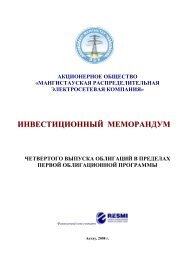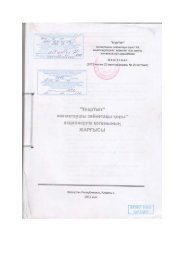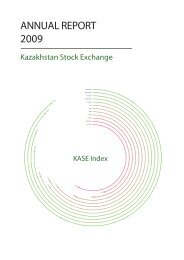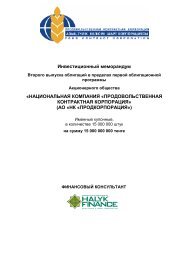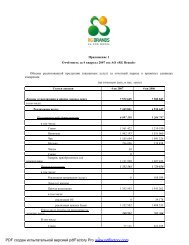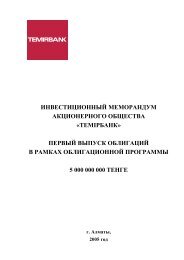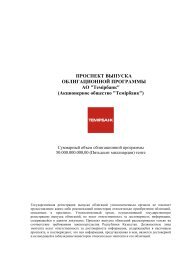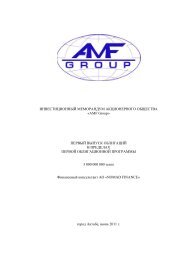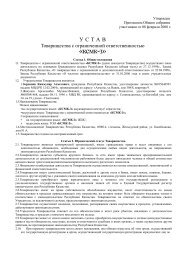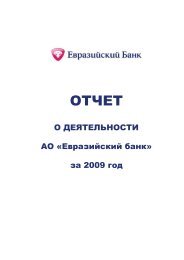JPMorgan - KASE
JPMorgan - KASE
JPMorgan - KASE
Create successful ePaper yourself
Turn your PDF publications into a flip-book with our unique Google optimized e-Paper software.
As of 1 January 2002, the population of Kazakhstan was approximately 14.8 million, a decrease<br />
of almost 1.2 million since January 1989, primarily due to continuing emigration by ethnic<br />
Russians and Germans. Kazakhstan is one of the most sparsely populated countries in the world<br />
with an average population density of approximately 5.5 people per square kilometer. The<br />
population of Kazakhstan is ethnically diverse.<br />
Kazakhs are the largest among the country’s approximately 126 different ethnic groups,<br />
accounting for 53 per cent. of the population, followed by Russians (31 per cent.), Ukrainians (4.4<br />
per cent.), Tartars, Germans, Uzbeks, Poles and others. The relative size of the Kazakh ethnic<br />
group has increased since the country’s independence, mainly because of the emigration of non-<br />
Kazakh ethnic groups and because of the return of many ethnic Kazakhs to the country.<br />
Historically, Kazakhstan belongs to the Turkic-speaking world. Kazakh, the official language, is<br />
spoken by approximately 50 per cent. of the population. Russian is spoken by more than threequarters<br />
of the population and is also officially recognized for use in State matters and local<br />
government.<br />
State education is provided free of charge and is compulsory from the age of six or seven; usually<br />
children attend at least 11 years of school. The majority of the population has a primary, junior<br />
and secondary school education. Entrance examinations are required for all universities and<br />
colleges, and approximately one-tenth of the population has a degree from a college or<br />
university level institution. Kazakhstan’s adult literacy rate exceeds 97 per cent. The secular<br />
nature of the country is enshrined in Kazakhstan’s constitution, which also ensures the right to<br />
religious freedom. Various religious and ethnic groups generally live in peaceful coexistence. The<br />
principal religions are Islam and Orthodox Christianity, but these faiths are actively practiced only<br />
by a minority of the population. The country is also home to Jews, Catholics and Protestants,<br />
particularly in the German communities.<br />
Constitution, Government and Political Parties<br />
Constitution<br />
Kazakhstan has been one of the most politically stable countries of the CIS. The country’s current<br />
constitution (the “Constitution”), adopted in August 1995, provides for a tripartite structure of<br />
government in which power is divided between the executive, legislative and judicial branches. It<br />
establishes and sets out the powers and functions of the President, the Parliament, the<br />
Government, the Constitutional Council and local governments and administrations and<br />
establishes an independent judicial system. Under President Nazarbayev, the Presidency has to<br />
date largely dominated the other branches of government.<br />
Executive Branch<br />
Under the Constitution the President is the head of state and its highest official with primary<br />
responsibility for domestic and foreign policy and the function of representing Kazakhstan in<br />
international relations, including the power to negotiate and sign international treaties. The<br />
President is also Commander-in-Chief of the armed forces. The President has the power to issue<br />
decrees and orders having the force of law (provided they are consistent with the Constitution),<br />
to determine the priority of legislation before Parliament and to call a national referendum on<br />
matters of special importance. The President also has the power to dissolve Parliament in the<br />
event of a Parliamentary vote of no confidence in the Government or the President, or following<br />
the failure by Parliament on two occasions to approve the appointment of the Prime Minister. In<br />
addition, the President may dismiss Parliament due to “political crises resulting from differences<br />
between the chambers of Parliament or between Parliament and other branches of State power”<br />
(including the President).<br />
B-2




